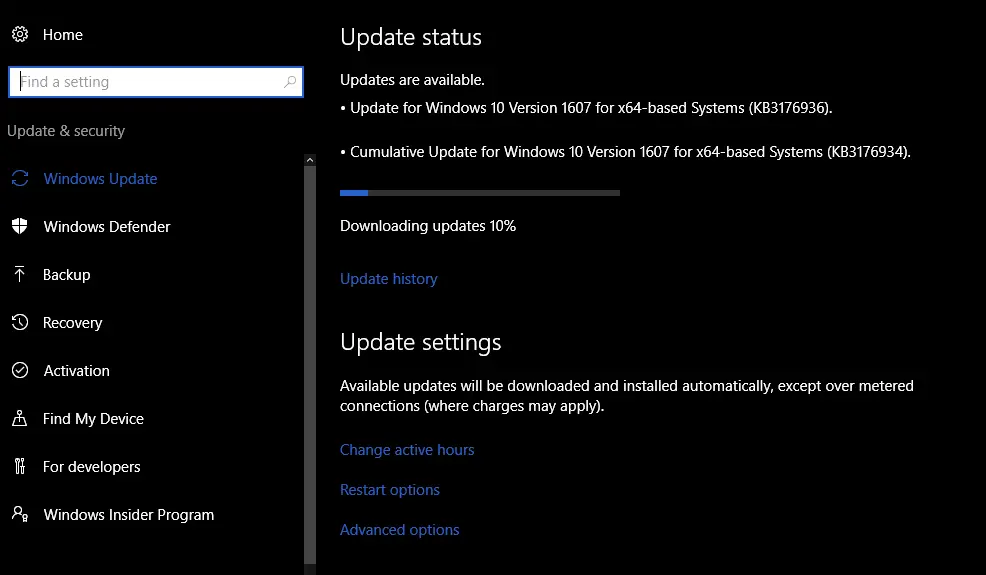Microsoft rolling out a new Windows 10 update KB3176936 and KB3176934. A new update is released for the Windows 10 anniversary update users with build 14393. According to the company, update KB3176936 makes stability improvements for the Windows 10 Version 1607 servicing stack. The other cumulative update KB3176934 will bring Windows 10 PC build to 14393.82 and mobile build 10.0.14393.82.
New in update KB3176936 and KB3176934, Windows 10 PC build 14393.82 and Mobile Build 10.0.14393.82
- Build 14393.82 improved the reliability of Network Controller, DNS server, gateways, Storage Spaces Direct, Group Managed Service Accounts, remote procedure calls (RPC), PowerShell, Internet Explorer 11, printer pairing and interoperability, the Windows kernel, Media Core, Windows Store, Connected Standby, Cluster Health service, the Hypervisor debugger and platform, and Active Directory.
- Build 14393.82 Improved the performance of Storage Spaces Direct with many nodes or disks, scrolling lists on Xbox One, DHCP address acquisition, Active Directory queries, and Cluster Health service.
- Update KB3176934 fixed an issue that prevents external media from playing on Xbox One using Cast to Device.
- Improved download size optimization of updates.
- Build 14393.82 fixed an issue with Mouse events not working correctly in Internet Explorer 11.
- Update KB3176934 fixed an issue with the rendering and resizing of nested tables in Internet Explorer 11.
- Addressed issue with the UI layout not updating correctly in Internet Explorer 11 quirks mode.
- Update KB3176934 fixed an issue that was causing nodes to be disconnected from a Cluster service intermittently.
- Mobile 10.0.14393.82 fixed an issue with the 3G and 4G options not appearing correctly in Windows 10 Mobile settings.
- Build 14393.82 also fixed additional issues with mobile device management (MDM) enrollment for an Azure Active Directory tenant, software compatibility, rendering of Yu Gothic fonts, Cortana, slow connections to cluster shares, Xbox One unable to launch the Netflix app using the DIAL protocol, Xbox One volume and music playback, all video stops while audio plays in a TV app, incorrect scaling of Internet Explorer 11 first-run dialog, driver setup, Windows Update for Business, apps failing to install after resetting device, boot failure with Hyper-V and BitLocker enabled, Cache Manager, Cluster Health service, inability to change roles and features on a locked device, disk-to-enclosure mappings not working, PowerShell, missing lock screen image, fitness tracker not recognized as a mass storage device, synchronization not working between Intune and Azure Active Directory (AAD), Skype calls over Wi-Fi, streaming playback using progressive download, unable to cancel download from Windows, extensions for Microsoft Edge, incorrect lock screen UI after resuming from hibernate and sleep, and blocked installation of game bundles from the Windows Store.
Windows 10 users can check their updates for Cumulative Update for Windows 10 Version 1607 for x64-based Systems (KB3176934) and Update for Windows 10 Version 1607 for x64-based Systems (KB3176936). Windows 10 Home users will receive these updates automatically, while Pro users need to check update manually if they have enabled ‘Defer feature updates’ in update settings.
There are reports that few users are facing problem in installing new Cumulative Update for Windows 10 Version 1607 for x64-based Systems (KB3176934) and Update for Windows 10 Version 1607 for x64-based Systems (KB3176936). If your update is stuck or failed to install, try our help guide.

